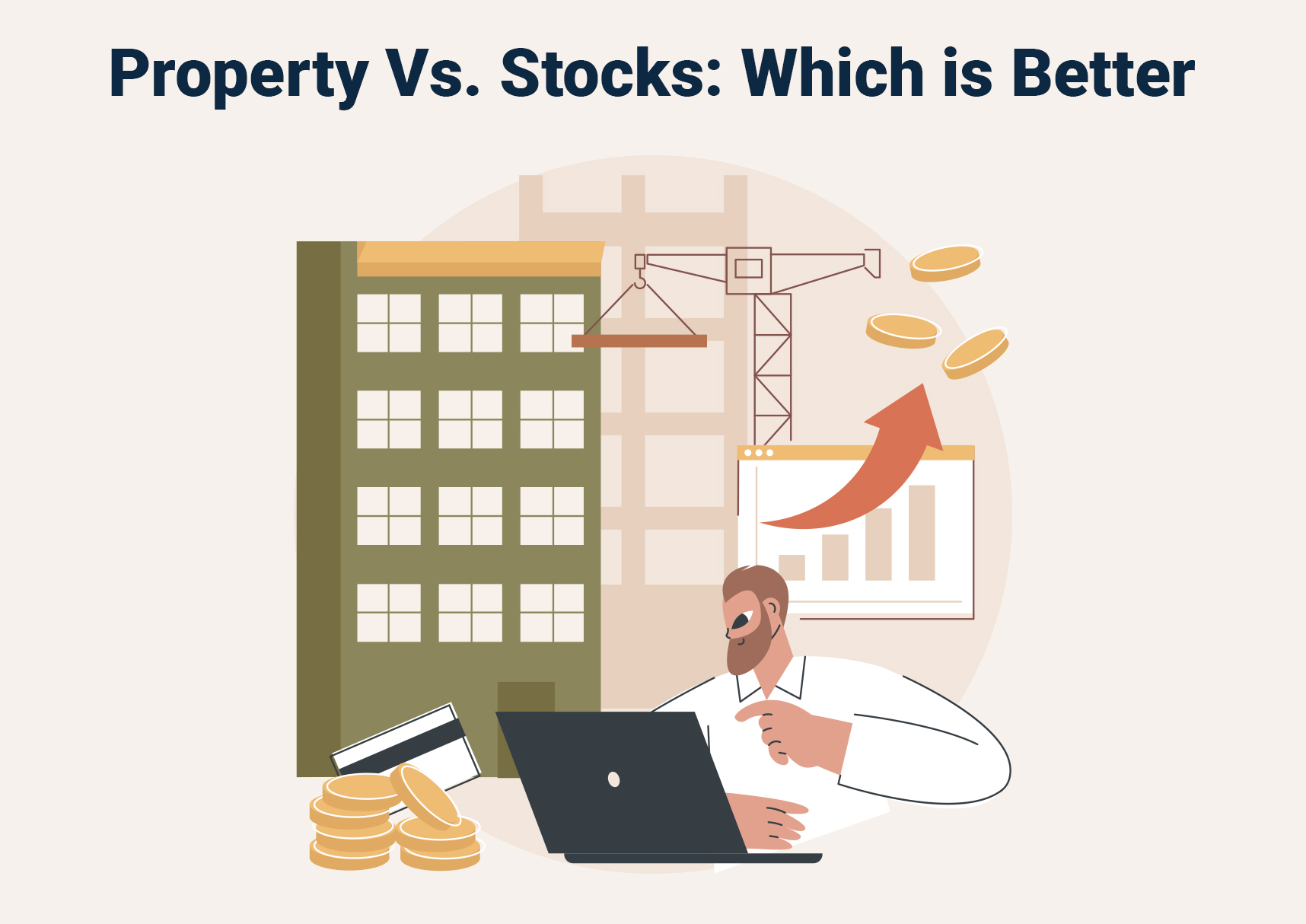Property Vs. Stocks: Which is Better

When it comes to investment in property vs stocks, the decision to invest will depend on your financial situation and goals. The two investment avenues offer different risks and opportunities.
Property is not as liquid as stocks and tends to require more time and money. But it’s a tangible asset that can deliver a passive income stream and potential for substantial appreciation. Stocks are subject to the economy and market conditions. But don’t require as much upfront capital and are much easier to buy and sell.
In this article, we take a look at property vs stocks! Also, how investing in real estate and the stock market can help you to make money over time and look at the pros and cons of investing in each.
Considering Property vs Stocks
Both investing in real estate and the stock market can be a savvy way to make your money work for you. When looking at the investments compared, both are passive income sources that can deliver good yields over time. However, both come with their own set of risks and drawbacks that investors should consider.
Stocks and property do not perform in the same way, and the growth of each is driven by different factors. This is good news for investors that have the means and capital to invest in both.
Is Property a Better Investment Than Stocks?
When considering whether one investment is better than the other, the answer is nuanced. First, let’s take a look at UK property trends on the whole.
Taking a long-term view, UK residential property has proved to be a solid investment. Last year saw property prices reach record-breaking levels. A residential property bought in 2002 for £100,000 would be worth over £270,000 in 2022 – impressive growth for just two decades. Those that invested in buy-to-let would have also taken advantage of rising rents as well as capital growth.
That’s not to say that property hasn’t experienced some downfalls. Over the previous 20-year period there were some volatile periods, such as the 2008 financial crisis. That said, one aspect of physical property is the ability to add leverage over time, for example through a mortgage lender who provides most of the cost upfront. Property has been particularly appealing over the last two decades because of low-interest rates and rising property values.
Property Trends in 2022
In 2022, we are seeing inflation and interest rates rise. UK inflation can have an impact on the immediate profitability of a property investment as rising inflation impacts the affordability of mortgage payments.
While the record-breaking house growth prices of the last couple of years are unlikely to be repeated, landlords can still expect growth in the value of their investments due to the fact that demand continues to outstrip supply in the UK housing market. Investors tend to take a long-term view of their investment, despite the fact that investing in property may be less attractive than before.
Stock Market Trends
Traded on a minute-by-minute or daily basis, stocks offer a completely different profile to property. Equities are a good opportunity for diversification, allowing investors to hold shares in large, recognised companies in the larger markets, as well as up-and-coming names that may be tomorrow’s winners. Stocks offer a kind of dynamism that the property market does not.
When you buy stocks you are investing in a tiny piece of the company and make value through the company’s stock increases and dividends. In a 20-year holding period, investments in the stock market range from 4-11% growth on average.
When it comes to comparing real estate and the stock market, it’s a bit like comparing apples to oranges with distinct factors that affect prices, returns and values. Let’s weigh up some of the pros and cons of each.
Property Vs Stocks: The Benefits of Investing in Stocks
Below are some of the key features that make investing in stocks beneficial:
- Liquidity
Your money is much easier to access when it is in stocks. Property is not a liquid asset and having to pull your money out suddenly by selling up puts you at the risk of not selling at the right time. Should you need money in an unprecedented emergency, it’s much easier to get your money out of stocks – you can buy and sell with low fees, usually the same day.
- Tax
Rental income from property is taxed based on your income level. If you have equities that are held in an ISA or pension, any income or capital gain is tax-free, offering a distinct advantage. Investment funds can be extremely tax efficient and act as a good form of passive income.
- Spread the Risk
You can take steps to reduce risk by having a diversified portfolio of stocks, shares and bonds across the world in different categories. With property you are putting a large sum of money in one property class that is in a set area of the country where the market can change. If the house price falls or the property bubble pops, this can be bad news for your investment.
- Stress
Property investment isn’t always smooth sailing and there is plenty of potential for things to go wrong and become a stressful situation. Maintenance problems can be a headache, as can bad tenants who default on rent. With stocks there is less to think about and many investors take a “set it and forget it” attitude, while more ongoing work is usually required of landlords.
- Knowledge
Being a successful property investor does require knowing which areas of the country present better yields, staying ahead of regional trends in the market and having an eye for the next hot spots for investing in property. Real estate requires lots of research – it’s not something you can go into casually and expect fast results and returns.
- Costs
Property costs money to maintain and a property can deteriorate quickly if not well taken care of. If you are trying to rent out a property, you’ll need to continually ensure it’s up to a good standard for tenants and that repairs or problems are quickly remedied.
Fire, flooding and other issues can wipe out your investment or take a huge chunk of it. Factors out of your control like bad neighbours or loud nearby construction projects can dampen the appeal of your property to tenants, leaving you with little ability to remedy the problem.
- Capital
Investing in property requires more initial capital. Stocks and shares are something that you can build up regularly in stages.
Property Vs Stocks: Is Property Better than Stocks?
Buy to let or stocks and shares? While stocks present plenty of advantages, under the right circumstances real estate can offer lower risks, yield better returns and provide strong diversification.
- Risk
Stock markets are subject to different kinds of risks – market, economic and inflationary. Stock values can be volatile and impacted by regional, geopolitical or company-specific events. Investors that choose not to diversify their holdings may in some instances experience greater gains but they also expose themselves to greater risks.
Some companies may show huge promise at the onset but end up with poor performance later which leads to falling stock prices. Even if investors do sell, they can no longer sell at a rate that allows them to break even on their initial investment.
- Income
Dividend-paying stocks can generate reliable income. However, it takes a large amount of investment in a high-yielding dividend stock to generate enough passive income. Investing in a property with good rental yields can provide a steady means of rental income. That not only covers things like the mortgage and repairs so the property takes care of itself, but leaves extra income left over, too.
- Long-Term Prospects
When it comes to buying an investment property, while real estate is not as liquid as the stock market, over the long-term the cashflow can provide decent passive income and a high chance of appreciation on the value of the property. As a tangible asset that can be controlled, real estate investors own something concrete for which they can be accountable. Stocks are impacted by many different factors, leaving less control.
- Hedge Against Inflation
When looking at real estate vs stocks, it’s important to look at the wider economy. With inflation on the rise in 2022 and beyond, property is generally a better form of investment. Particularly when taking a long-term view.
Property is one of the best assets for returns. While immediate profitability may be impacted, in the long-term, this tends to level out. By contrast, most savings accounts still have low interest rates and the stock market is tumultuous with economic uncertainty. What’s more, while it’s possible to invest in stocks on the rise, it’s also possible to become much worse off if investing in the wrong stocks.
- Volatility
The stock market tends to be more volatile than real estate. This leads to a more risky investment especially if you panic sell. Selling stocks may make your tax burden much heavier due to the resulting capital gains. At the same time, some stocks may move sideways for years, meaning your investment doesn’t grow much.
- Knowledge
With so many stocks, investors have a great deal of choice. But it takes time, effort and knowledge to thoroughly look into each prospect and determine if it’s worth investing in. You’ll need to read financial reports, look into historical performance and monitor the market, which can be time-consuming.
What Grows Faster Stocks or Real Estate?
When looking at investing in real estate vs stocks, investors should take a long-term view. Over the last 20 years, UK property value increased on average by over 170%. FTSE 100 index prices over the same period grew around 29%. It’s important to consider growth potential on an asset. When taking the last 20 years into consideration real estate capital growth performed better than the stock market.
Should I Invest in Property or Shares?
When deciding between property vs stocks or buy to let vs stocks, it all comes down to your goals as an investor. Huge growth can happen day by day in the stock market. Which is why many investors buy low and sell high. With property, profit tends to come over a longer-term period. Which is why it is often seen as a more secure and long-term investment.
When it comes to investing in property vs stocks both have their pros and cons. Both require time and knowledge and a certain appetite for risk. With Brexit and the Covid-19 pandemic knock-on effects causing uncertain economic times, investors may be looking for avenues that carry lower risk. In terms of a return on investment, property has performed strongest in the last two decades. Ultimately investors should choose the avenue that best works with their goals. If you’re looking to buy an investment property, get in touch with our experts today.

